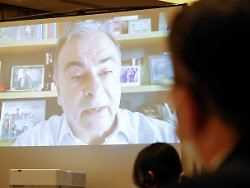Monday, December 6th, 2021
Two years after escaping in Kiste
Ghosn criticizes Japanese “hostage justice”
The ex-boss of Renault and Nissan fled from Japan to Lebanon two years ago, hidden in a box. The investigations against him for violating stock exchange requirements do not come to a standstill. Ghosn is not at all satisfied with the judicial proceedings from a distance.
Ex-car boss Carlos Ghosn continues to see himself as a “hostage” of the Japanese justice system after his spectacular escape from Japan to Lebanon. Even after two years, Japan refuses to hand over the indictment against him to Lebanon so that he can face a fair trial there, said Ghosn, who is online from Beirut, to members of the club of foreign correspondents in Tokyo. By maintaining the search request through the international police agency Interpol, Japan is trying to “extend its hostage justice beyond Japan’s borders”. Japan is not about justice.
The architect of the Franco-Japanese car alliance Renault-Nissan-Mitsubishi was arrested and charged on November 19, 2018 in Tokyo, among other things, for violating stock market requirements. In April 2019, he was released from custody under strict conditions on bail. Ghosn then fled in an adventurous way hidden in a box by private jet via Turkey to Beirut at the end of December. The manager also has Lebanese citizenship.
Two Americans extradited to Japan who helped him escape were sentenced to prison terms by a court in Tokyo earlier this year. The two US citizens, father and son, admitted in court that they helped Ghosn escape Japan at the end of 2019. Former US soldier Michael T. has been imprisoned for two years, his son Peter T. for 20 months.
Ghosn has repeatedly denied the allegations against him in Japan. The former auto boss sees himself as the victim of a conspiracy in Japan to prevent Nissan from becoming closer to Renault.
